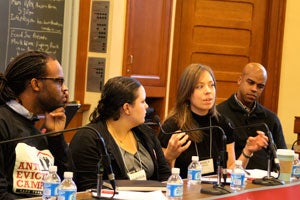As the groundbreaking anti-foreclosure work by HLS students continues to land significant victories for homeowners in Massachusetts, a conference last week to spread the Harvard model was attended by more than 150 lawyers, law students and community organizers from around the country who want to halt foreclosures in their own communities. (See conference video below.)
The second annual HLS “Community Responses to the Foreclosure Crisis” conference, organized by the Harvard Legal Aid Bureau (HLAB), ran for three days and included panel discussions and small, interactive workshops where participants received practical advice for fighting foreclosures. Attendees hailed from California, Illinois, Maine, Florida, Maryland, and other states; many received grants from HLAB to travel to the conference. Law schools represented included American, the University of Miami, Northeastern, Suffolk, John Marshall, and the University of Iowa.
The first conference, held in November 2010, drew about 100 participants, so this year’s increased attendance was gratifying to the students involved. “It was a lot more people than last year, so we’re really pleased,” says Sam Levine ‘12, President of HLAB’s Foreclosure Task Force, which offers legal representation to every tenant or owner in foreclosure in Boston. Levine also serves as outreach director for Project No One Leaves, a student initiative launched several years ago by HLS students that canvasses foreclosed homes each week to inform tenants and owners of their legal rights.
The conference was designed to share the innovative approach to fighting home foreclosures devised by HLS students and their community partners including City Life/Vida Urbana and Greater Boston Legal Services. It relies on a multi-pronged model that includes neighborhood canvassing, attempting to change the law by arguing before the Massachusetts Supreme Judicial Court, drafting a new law to better protect tenants, landing significant verdicts against banks for not taking care of foreclosed-on properties, and helping people buy back foreclosed-on homes at prices they can afford.
Topics at the conference, which included national leaders in anti-foreclosure work, included how to partner with local government, instigating social change through media, community organizing, litigation strategies to stop foreclosure, legislative advocacy, and more. Participants had the opportunity to canvass foreclosed properties throughout Boston to inform homeowners and tenants of their rights. “What was really cool was on at least two of the canvasses, we found houses that already had City Life posters on them,” says Levine, “so the people who came with us were very impressed” that early in the foreclosure process, the homeowners were already aware of the resources available to them through No One Leaves and its community partners. “The fact they’re already tapped into City Life means the system is working.”
Among those who spoke at this year’s conference was Nick Hartigan ’09, a former HLAB student who in 2008 co-founded No One Leaves with David Haller ’09 as a response to the burgeoning number of Boston families losing their homes to foreclosure. Hartigan, who is now practicing law in Washington, D.C., described his work at No One Leaves as the most fulfilling of his life, says Levine.
Several of this year’s participants shared success stories of the past year. No One Leaves Miami canvassed 2,000 homes over the past year, its representatives reported. And No One Leaves Springfield, in Massachusetts, not only has a successful canvassing program in place but won passage of two important city ordinances, including one that requires mediation between homeowner and lender before foreclosure can proceed, and another that requires lenders to keep foreclosed-on properties in good condition.
The efforts of the Boston coalition to protect homes and communities from foreclosure have been featured in The Nation, The New York Times, The Boston Globe, on PBS, and on the CBS Evening News. This year’s conference will also be featured in an upcoming documentary about grassroots efforts to fight eviction.
In the opening Panel on Foreclosure Policy, professors and academics provided an overview on the current state of foreclosure policy nationwide and presented new policy ideas and initiatives that may help stem the foreclosure crisis.
Click here to watch the video.
Additional Panels:
Welcome Presentation / Community Organizing Workshop
Leaders from City Life/Vida Urbana of Boston lead a workshop on developing an effective anti-foreclosure community organizing program. The workshop addressed how to start a successful community organizing campaign, key community organizing tactics to fighting foreclosures, and strategies for sustaining and expanding anti-foreclosure movements.
Litigation Strategies to Stop Foreclosure
Attorneys from judicial and non-judicial foreclosure states discussed successful legal strategies for fighting foreclosure. Panelists discussed the “produce the note” legal strategy and foreclosure defense in the context of bankruptcy and predatory lending litigation.
Foreclosure Prevention: Alternatives to Litigation
Panelists discussed the potential and limitations of non-litigation foreclosure prevention strategies. The panelists explore how these efforts, like mediation programs and mortgage workouts, can and should interface with the work of community organizers.
Using Legal Tactics to Fight Post-Foreclosure Eviction
Panelists from several direct legal services organizations discussed successful legal strategies for fighting post-foreclosure evictions of both tenants and former homeowners. In particular, panelists addressed how to use legal tactics to support anti-foreclosure organizing programs.
Community Banks Workshop
Boston Community Capital (BCC) lead a workshop on how community banks can enable former homeowners to re-purchase their homes. BCC presented its innovative home ownership preservation program in which it negotiates with banks post-foreclosure to buy back homes at their present market value as opposed to the inflated value reflected in the original mortgage, and then re-sells the homes back to their former owners at the lower rate.
